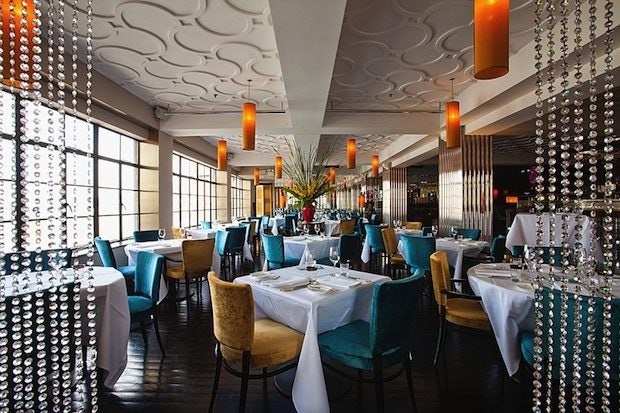
The exclusive Crystal Room at Shanghai's M on the Bund. (M on the Bund)
Foreigners have been writing about their experiences in China for as long as they’ve been traveling there. However, China’s economic changes have meant that the types of experiences they’re having and writing about have changed dramatically in the past few decades.
As a result, a new anthology of essays by foreigners living in China entitled Unsavory Elements features not only expats’ accounts of travel through rural areas or adjusting to cultural differences, but also their encounters with the country’s new wealth.
The diverse range of 28 stories shows the many reasons expats visit China, including to do business, travel, or write. As a result, the book shows the good, the bad, and the ugly when it comes to foreigners’ behavior and assumptions about the country. The title of the book comes from a Mao-era term describing unwanted foreigners in China, and it can be hard to argue with it when reading some of the more downright cringe-worthy essays (especially some discussing foreign men’s attitudes about women).
The stories that interested us were those related to foreigners making their foray into the world of business in China, including when it comes to working with China’s newly wealthy. Below, we’ve included an excerpt from the chapter “Empty from the Outside” by Shanghai-based author Susie Gordon, recounting her experience on a night out with an ultra-rich business partner who was a member of China’s nouveau riche, as well as an interview with book editor Tom Carter on why it was so important to include stories about China’s newfound wealth in the collection.
If you want to learn more about what it’s like to rub elbows with China’s wealthy, check out our interview with Gordon, and if you want to read the book, it's available on Amazon and at Earnshaw Books.
Excerpt:#
Located on the Bund, overlooking the river and the neon shards of the Financial District, Crystal Room was one of the most exclusive restaurants in Shanghai. The private room that Li always booked had a minimum charge of several wan yuan, and served the sort of lavish traditional fare that’s more for show than taste: abalone, bird’s nest soup, shark fin...
Before long, the revolving glass at the center of the table bristled with spirit bottles – the best rice wine, 60-year-old baijiu, Guizhou Moutai – and the toasts began. Regular baijiu strips your sinuses and tilts your vision back an inch when you swallow, but this stuff was different. We had knocked back about four shots each by the time the food came, but the effect was mellow and jovial. I didn’t know how much each bottle cost, but it must have been in the tens of thousands. The food was equally luxurious and abundant, coming dish after dish, carouselling in front of us on the revolving glass.
I found this kind of banquet intriguing, not just for the wealth of the participants or the profligacy of their spending, but because, when it came down to it, they were no different than any other dinner taking place at that same moment in any other part of the city or country. Whether the guests were moneyed or peasants, whether the dish contained shark fin or Anhui vegetables picked out of the ground, whether they’re toasting with century-matured maotai, or cheap, rank erguotou, the conviviality, the speeches and the exhortations are all the same: “To health…to money…to happiness…to more money…to friends.”

Tom Carter. (Yixiao Tan)
Why was it important to include a story about China’s elite in this collection?#
My intention as the editor of Unsavory Elements was to include every conceivable experience an expat in modern China might have, from the common to the uncommon. An encounter between a foreigner and fuerdai would fall into the uncommon; aside from the occasional news feature, it’s simply never been written about before in long-form by a Westerner. The tales in Unsavory also range from the timeless to the timely, and in that regard, including a fuerdai piece would put this book on the cutting edge of the China expat genre. So I set out to find a writer who not only had such a story to tell, but could tell it well.
How hard was it to find a writer with a story about China’s ultra-wealthy?#
It was the single most difficult piece for me to commission. I wanted to tap a writer who could capture the glamour of China’s cosmopolitan cities and the extravagance of the people’s newfound luxury. Yet, of all the expatriate writers I approached, absolutely none had had an encounter with the Chinese elite! To add to my frustration, few if any had any contemporary experiences specifically set in Shanghai, a city I was determined to include to balance out all the Beijing-based stories. It took months of scouring bookstores and blogs before, by sheer serendipity, I stumbled upon the edgy yet poetic writings of Susie Gordon. We met in downtown Shanghai, discussed her experiences here, and as it turned out, the tales she had to tell were doozies.
Additional stories in the book focused on foreigners navigating the business world in China. Why do you think these types of stories make for such entertaining reading?#
Westerners were coming to China to do business centuries before it ever became a tourist destination. We have rightly earned the epithet “Capitalist Roaders”, though ironically the economic tables have been turned on us in recent times. But the resulting adventures from our business dealings here have always made for good reading, beginning with the classic works of Carl Crow (400 Million Customers) in 1930s Shanghai. Unsavory Elements sought to update those experiences to reflect the rapid development that has taken place here this past decade. But just as New China is ever-changing, so too is its corporate culture, so for my next China anthology I may focus expressly on stories from the front lines of finance and business.